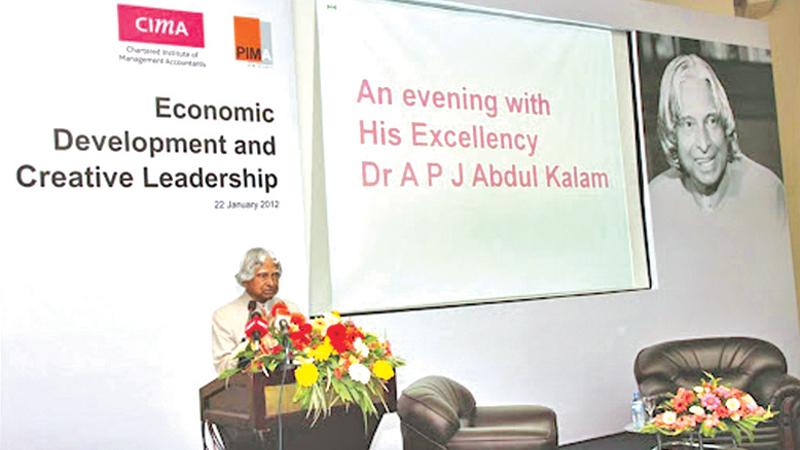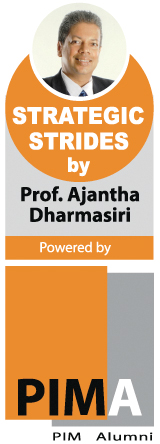
 Much has been written about a great human being named Avul Pakir Jainulabdeen Abdul Kalam. He was much loved by the world not only as a brilliant scientist but as a diligent strategist. I still remember the day Dr. A. P. J. Abdul Kalam visited the Postgraduate Institute of Management (PIM) in January, 2012. Even though it was a long time ago, what he said is of much relevance even today. Today’s column is all about reflections on what he shared with us at PIM.
Much has been written about a great human being named Avul Pakir Jainulabdeen Abdul Kalam. He was much loved by the world not only as a brilliant scientist but as a diligent strategist. I still remember the day Dr. A. P. J. Abdul Kalam visited the Postgraduate Institute of Management (PIM) in January, 2012. Even though it was a long time ago, what he said is of much relevance even today. Today’s column is all about reflections on what he shared with us at PIM.
Overview
Dr. Abdul Kalam visited Sri Lanka for the first time in 2012. As a “People’s President” he received a rousing welcome. Among the many activities in his agenda, he delivered a speech on ‘Ignited Minds of Youth is a Great Resource for Nation’ at the Bandaranaike Centre for International Studies. He visited Jaffna University as well. What was so special to us was that the Alumni of the Postgraduate Institute of Management (PIMA) and the Chartered Institute of Management Accountants (CIMA) had jointly organised an evening lecture at PIM on “Economic Development and Creative Leadership.”
Succeeding with integrity
“Dear friends, let me put forth a question to all of you: India, China may become economically developed and G-8 may thus become G-10 or G-11 or G-12. But, would this select group of economically developed nations bring global prosperity, peace, and happy societies in the world? “ Dr. Kalam asked this question from a packed audience. Replying to himself, he described a distinctive profile for the Nations of the World in 2030. The following were the salient features:
A world of nations where the divide between rural and urban, rich and the poor, developed and developing has narrowed down.
A world of nations where there is an equitable distribution and adequate access to energy and quality water.
A world where core competencies of each nation are identified. Missions synergising the core competencies of different nations lead to economic advantage and faster development for all the societies.
A world of nations where all the students of all societies are imparted education with a value system.
A world of nations where affordable quality health care is available to all.
A world of nations where the governance is responsive, transparent and corruption free.
A world of nations where crimes against women and children are absent and none in the society feels alienated.
A world in which every nation is able to give a clean green environment to all its citizens.
A world that is prosperous, healthy, secure, devoid of terrorism, peaceful and happy and continues with a sustainable growth path.
A world of nations with creative leadership who ensure effective mechanisms to resolve conflicts between nations and societies in a timely manner keeping overall peace and prosperity of the world as a goal.
According to Dr. Kalam, the realisation of this vision will require, above all, creative leaders with the qualities of nobility, compassion, innovation, transparency, and benevolence. He also mentioned that this world Vision 2030 has been derived out of the Distinctive Profile of India by 2020. ‘Since you are all from the management and business community of Sri Lanka, let me explain what sort of business opportunities are awaiting in India, so that India and Sri Lanka can work together to improve their bilateral relationship. To achieve the distinctive profile of India before 2020 in the similar lines, we have the mission of transforming India into a developed nation,” he said.
We have identified five areas where India has a core competence for integrated action:
(1) Agriculture and food processing (2) Education and Healthcare (3) Information and Communication Technology (4) Infrastructure: Reliable and Quality Electric power, Surface transport and Infrastructure for all parts of the country and (5) Self reliance in critical technologies. These five areas are closely interrelated and progressing in a coordinated way, leading to food, economic and national security.
The knowledge society in the 21st century
“The world in the 21st century will be a knowledge based society with multiple opportunities”, said Dr. Kalam. He was referring to a book, ‘Empires of the Mind’ by Denis Waitley. This book gives what type of the new world which we are facing now? What was yesterday and what is today. “I have modified certain points of the author to suit our conditions. I have also added a third line which is pertinent to the action required by the management institutions.”
It specifically says that “what worked yesterday, won’t work today.”
1. Yesterday – natural resources defined power. Today - knowledge is power.
Institutions will be the powerhouse for knowledge
2. Yesterday - Hierarchy was the model. Today- synergy is the mandate.
Institutions will be the enabler of intersection of multiple faculties towards mission goals
3. Yesterday – leaders commanded and controlled. Today – leaders empower and coach.
Potential leaders will be empowered through exposure to the needs of sustainable development
4. Yesterday - shareholders came first. Today – customers come first.
Education should inculcate sensitivity to customer needs
5. Yesterday - employees took orders. Today – teams make decisions. Institutions can inject team spirit.
6. Yesterday - seniority signified status. Today – creativity drives status. Institutions are the breeding ground for creativity.
7. Yesterday – production determined availability. Today – Competitiveness is the key. Competitiveness is powered by research and universities has to have the motto of “teaching-research-teaching”.
8. Yesterday - value was extra. Today – value is everything. Value based education has to be introduced as a part of the curriculum, at least for one hour every week
9. Yesterday – everyone was a competitor. Today – everyone is a customer. During education industrial and entrepreneurship training is essential
10. Yesterday - profits were earned through expediency. Today – Work with integrity and succeed with integrity.
Home, organisations, and educational places should become learning places “I am sure, all the members present here will keep these aspects of the 21st century in mind which will facilitate the Youth of Sri Lanka to evolve the learning process for meeting the demands of the 10 components of knowledge society. For that what is needed is creative leadership. I am sure, the management, professional and other education systems in Sri Lanka will be geared up for the generation of a large number of creative leaders needed in different disciplines required for national economic development,” he said.
“Since I am in the midst of the business community, I would like to give the links between national economic development and creative leadership,” said Dr. Kalam.
Economic development and prosperity
Dr. Abdul Kalam presented how economic development leads to prosperity in a sequential manner.
Nations Economic development is powered by competitiveness.
The competitiveness is powered by knowledge.
The knowledge power is powered by Technology and innovation.
Technology and innovation are powered by resource investment.
The Resource investment is powered by revenue and return on Investment. The Revenue is powered by Volume and repeat sales through customer loyalty.
Customer loyalty is powered by Quality and value of products.
Quality and value of products is powered by Employee Productivity and innovation.
The Employee Productivity is powered by Employee Loyalty, employee satisfaction and working environment.
The Working Environment is powered by management stewardship.
Management stewardship is powered by Creative leadership.
For success in all missions, we need creative leaders. Creative leadership means exercising the vision to change the traditional role from the commander to the coach, manager to mentor, from director to delegator and from one who demands respect to one who facilitates self-respect. The higher the proportion of creative leaders in an organisation, the higher the potential of success and the growth of organisation and thereby leading to accelerated national economic growth.
Dreams into action
“Dear friends, I have seen three dreams which have taken shape as vision, mission and realisation,” reminisced Dr. Kalam. The space program of ISRO (Indian Space Research Organisation), AGNI program of DRDO (Defence Research and Development Organisation) and PURA (Providing Urban Amenities in Rural Areas) became the national mission. Of course, the three programs succeeded in the midst of many challenges and problems. I have worked in all these three areas. I would like to convey to you what I have learnt on leadership from these three programs and the personalities whom I have discussed.
Dr. Kalam went on to spell out the features of creative leaders.
The leader must have a vision.
The leader must have a passion to transform the vision into action.
The leader must be able to travel into an unexplored path.
The leader must know how to manage success and failure.
The leader must have courage to make a decision.
The leader should have Nobility in management.
Every action of the leader should be transparent.
The leader must work with integrity and succeed with integrity.
Interestingly, we saw all the above in the late Dr. Abdul Kalam.
“For a vibrant business, the important thrust will be on the generation of a number of creative leaders who will create, nurture and grow the business to its full potential by combating all the challenges faced in the process. My greetings and best wishes to all the participants’ success in the mission of creating new opportunities of growth through creative leadership,” said Dr. Kalam.
Way forward
“Dreams are not what you see when you sleep, they are the ones that keep you away from sleep.” This statement from Dr. Abdul Kalam simply depicts the devoted achiever he was. It significantly amplifies the purpose-driven life of Dr. Kalam. Perhaps a fitting tribute to him from Sri Lankan managers would be to diligently work towards not only the organisational progress but the societal wellbeing as well. Leaders of his calibre are in much higher demand today than never before.
